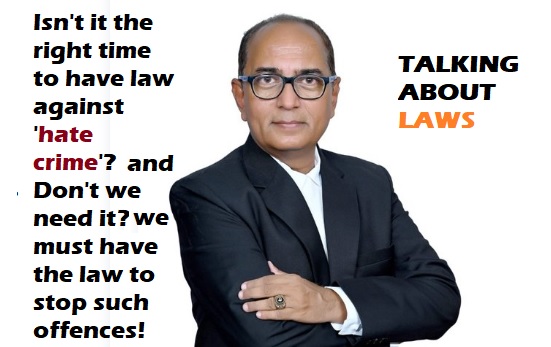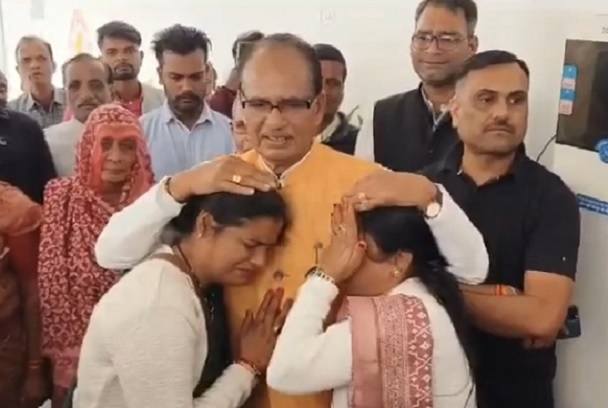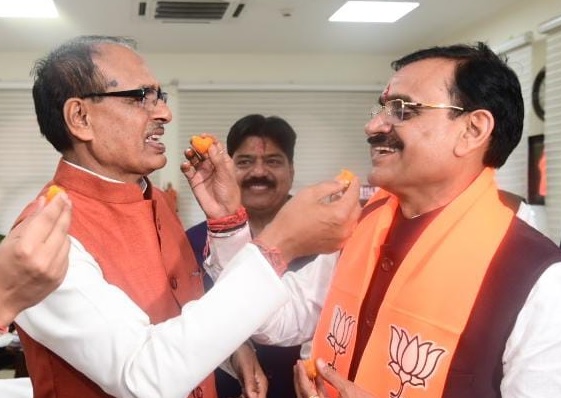Hate Crime: Isn't it the time to have law against 'hate crimes' to stop lynching, such offences in India

Shahid Parvez Sayed
NewsBits.in
When my elderly mother realized that she does not have much time left, she called both of my brothers and me one weekend and stretching her hand out said. "Swear on my hand that you will not fight among yourself after I am gone’.
I had tears in my eyes as I obeyed her. She died, leaving me angry and hurt. I wanted to go ballistic on my brothers for how her end came, but reminded of the promise I had made to her. So, I went into my shell to grieve and not harbour any ill will against my brothers. Years later I am beginning to admire her wisdom.
The point is that when my mother who knew the fault lines, temperament and the nature of each of her sons could manage to keep peace between us in her absence then why the makers of modern India with all the tools at their disposal could not find a formula to keep harmony in between various class, caste, and religion of people after they were gone?
Why the makers of modern India didn’t understand the weight of innumerable fault lines among citizens and why they chose to rely on good old British section of IPC for keeping India trouble free and in harmony among its vast and varied population?
WHY OUR LEADERS WHO WERE LAWYERS & JURISTS TOO DIDN'T BRING LAW AGAINST HATE CRIME
Were they too idealist in the sense that they did not foresee the danger of hate crimes in a diverse country like India where every 300 km there is a new language, different food habits, unique traditions, diverse faiths and changing sensibilities. Why didn’t they define hate crime? Why didn’t they write separate laws against hate crimes?
At one point the constituent assembly had a majority of lawyers and one expected them to foresee the issues that have the potential to damage the implementation of the Preamble of the Indian Constitution.This requires an in depth analysis of the debates of the constituents assembly which is beyond the scope of this article.
Let’s call 'hate crime' a 'hate crime'. Hate crimes are acts of violence, harassment or discrimination driven by prejudice based on factors like religion, race, caste, sex, or place of birth. They cause physical harm, emotional trauma and instil fear, damaging social cohesion and the values of a democratic society.
PARTITION, THE DEADLY VIOLENCE AND FALLOUT WAS BECAUSE OF HATRED
Partition is blamed for 1 million deaths and 2 million displaced and dishonoured. The real reason for partition and mayhem that followed was “hatred for others” that converted Indian borders into the killing fields. Since then how far have we travelled? Sure we did.
We have made progress in ‘dog whistle vocabulary’ of inciting hate crimes, perpetrating them and recording them. Now, not only hate crimes take place, people record them for posterity and live streaming. The heinous acts go viral on social media. Is this how we plan to become world leader?
What happened to the natural process of human evolution? It is crucial to recognize the detrimental impact of hate crimes on our society and work towards dismantling such acts of violence and discrimination. Promoting education, fostering empathy, and encouraging open dialogue are vital steps in combating hatred and building a harmonious society.
Let’s do the numbers:
There is a lack of proper data on the hate crimes or even communal riots in this country. There is a dearth of complete and authentic data on how many riots took place every year in India, resulting in number of deaths, destruction and displacements. An internet search provides the following incomplete picture, which is too scary to be ignored.
One conclusion we can draw from the data and that is each party has failed in the past to control violence emanating from from hate crimes and failed to promote ‘fraternity, individual dignity, unity and integrity of the Nation’ as envisioned by founding fathers in the Preamble of the constitution.
The table below shows the government belongings to different parties were unable to eliminate the threat of communal or hatred violence. The data below shows those incidents where deaths were more than 100.
S.No. Year I Place I Lives Lost I Ruling Party
Who was CM / PM
1 1967 Hatia Ranchi 183 Jana Kranti Dal MP Sinha
2 1969 Ahmedabad 512 Congress Hitendra K Desai
3 1970 Jalgaon 100 Congress Vasantrao Naik
4 1979 Jamshedpur 120 Janata Party Karpoori Thakur
5 1980 Moradabad 1500 Congress VP Singh
6 1983 Nellie, Assam 1819 President's Rule
7 1984 Bhiwandi 146 Congress Vasantdada Patil
8 1984 Delhi 2733 Congress (UT) Rajiv Gandhi
9 1985 Ahmedabad 300 Congress MS Solanki
10 1989 Bhagalpur 1161 Congress SN Singh
11 1990 Delhi 100 Union Territory VP Singh
12 1990 Hyderabad 365 Congress Chenna Reddy
13 1990 Aligarh 150 Janata Dal Mulayam Singh Yadav
14 1992 Surat 152 Congress+JD(G)+JD Chimanbhai Patel
15 1992 Kanpur
16 1992 Bhopal 143 BJP Sunderlal Patwa
17 1993 Mumbai 872 Congress Sudhakarrao Naik
18 Finally, the biggest of all in 2002 in Gujarat
If one counts ALL the incidents of hate crimes in India, the number goes to staggering figure between 2016 – 2020, 3,399 cases of communal or religious rioting in the country in the same five year period which is mind boggling but not unexpected. The information on the scale of rioting witnessed in the country for a five year period was provided by Union minister of state Nityanand Rai in response to a question raised by Congress MP Shashi Tharoor and BJP MP Chandra Prakash Joshi.
Economic Loss
Major riots in India have a significant negative impact on the country's GDP, resulting in the loss of billions of dollars. In 2020, while the global cost of riots amounted to $16.5 trillion, India alone incurred a cost of $646 billion, equivalent to approximately 6% of its GDP. This huge amount could have been used to fund the nation's budget expenditures and various welfare programs effortlessly.
Such economic losses undermine the aspirations of achieving a 5 trillion-dollar economy, as they continuously drain the country's resources year after year. By implementing measures to prevent this economic leakage, India would not only safeguard its financial stability but also showcase true nationalism by prioritizing the well-being of its citizens and the growth of its economy.
Loss of Human resources
The Indian youths that carried away due to their naivety or brainwashing, live with guilt and anxiety all their lives. There is a saying that, ‘No man is the same after he commits a murder or rape’. There are always some born monsters out there, but ordinary youths suffer rest of their lives in silence.
They are unable to lead a happy life and are in perpetual state of depression and paranoia. Those that made them commit these crimes have no idea what damage they have caused to the Indian youths for a long time to come. It is in a way unbelieve to imagine the impact.
Emotional loss
Emotional losses are also prevalent in the aftermath of riots. It is fallacious to claim that violence inflicted upon a particular community is a justified lesson or retribution. Every riot involves victims on both the sides, some identified as victims and others as accused for perpetrating the violence.
The consequences of such mayhem are far-reaching, affecting the lives of individuals and leaving an emotional scar on society. No one escapes aftermath of mayhem. Creating a happy and secure society relies on the well-being of its citizens. A harmonious and law-abiding community starts with nurturing happy families. It is crucial to understand that there are no winners in a riot; everyone suffers.
Acknowledging the emotional, economic, and human resources losses incurred is essential for fostering empathy, healing, and building a society that values peace and unity. In the next part of this two part series, we will analyse the laws available to control this menace and what more can be done to make every Indian safe anywhere in India.
[This is the first of the two parts [article] on this subject. Shahid P. Sayed is an Advocate who is practicing in High Court. He holds the degrees of D.E.(Civil), B.E.(Construction), M.S.C.E.(USA), M.B.A.(USA), LL.B.(India), D.S.F. and M.J.(India)]










